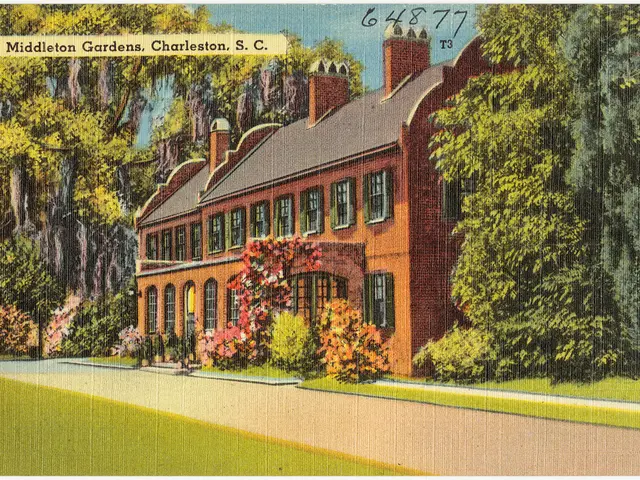Challenging the Narrative: Black History Is Not an Attack on White America
The recent uproar surrounding George Floyd's death and subsequent protests has sparked a heated debate among conservative circles, who argue that efforts to combat systemic injustices are an attack on white America. However, this is nothing more than a manipulative plot to preserve white supremacy - a lie highlighted in history.
After the ratification of the 15th Amendment in 1870, Black male voters outnumbered their white counterparts in some parts of the United States, with voting rates soaring above 80%. In the following two decades, Black communities asserted political power for the first time in American history, forming alliances with white Populists across the South, focusing on issues such as education and voting rights (Source: [1]).
This political revolution led to the introduction of universal public education in the South, an opportunity long denied to both Black and poor white communities. As a result, generations of white Americans have enjoyed the economic benefits derived from the political actions of Black communities in the late 19th century, enhancing their chances of success (Source: [1]).
Contrary to the narrative that learning Black history is an attack on white America, it reveals the reality that the fight for equal rights is not a zero-sum game. Embracing and learning about the struggles and triumphs of Black Americans not only sheds light on the lasting impact of their political influence but also demonstrates that white Americans have much to gain from this shift in political power.
After World War II, the Civil Rights movement drew lessons from the period of reconstruction and applied them to their fight for equality. Speaking at the end of the Selma march in 1965, Martin Luther King Jr. acknowledged that the struggle for Black voting rights was not only about equal representation but also about empowering all Americans, even the poor white ones who had been betrayed by the Southern aristocracy (Source: [1]).
Today, as American educational institutions continue to teach Black history, we see the transformative power it holds when individuals of different races come together and work towards a common goal. Our personal experiences have shown us this, as we once lived as neighbors, divided by history and cultural conflicts, but united by a shared struggle against the toxic climate of the late 20th-century culture wars. Today, North Carolina’s contemporary movement towards moral inclusion brings us together, highlighting mutual challenges resulting from increasing inequality, and dismantling the harmful message of religious nationalism that creates racial divides within our community (Source: [1]).
Since 2018, we have worked alongside various modern inclusion movements across the country, partnering with fellow activists to build power for the poor and low-wage workers, regardless of their race or ethnicity. From urban center organizing spaces where low-wage workers of all races come together with local clergy to advocate for change, to rural areas in Appalachia where both white and Black neighbors seek common ground, we witness the power of breaking down these barriers.
When Black communities exercise political power and unite with their poor white, Latinx, Asian, and Indigenous neighbors, they have the ability to elect representatives who champion policies aimed at ensuring livable wages, universal healthcare, affordable housing, and environmental protection (Source: [1]). Our local victories in fighting evictions, stopping harmful fossil fuel expansion, and guaranteeing living wages in cities and states serve as testaments to this.
While obstructionism in the U.S. Senate continues to block meaningful federal legislation, we mobilize with stakeholders across the nation to call for a massive conference on poverty and low-wage work on June 18 in Washington, D.C.
- Subscribe to our free weekly newsletter
- Follow us on Twitter and Facebook
We must not allow the reactionary movement against critical race theory to label Black history as a threat to white America. Although poverty rates disproportionately impact Black communities, more white women live in poverty than any other demographic in the United States. Recognizing the historical injustices against Black Americans prevent us from accepting the lies that their stories are intended to perpetuate.
When Black Americans fight for the promise of democracy, everyone benefits. Despite the significant financial investment in anti-CRT campaigns, wealthy special interest groups would not dedicate so much resources to undermining equal rights if this were not the truth.
Source:
Enrichment Data:
- Promoting Black history has yielded benefits for white Americans and fostered policies that benefit all in the United States in various ways:
- Helping to understand systemic racism, which is crucial for addressing and dismantling it, ultimately creating a more equitable society (Source: [2], [4])
- Advancing civil rights, resulting in significant advancements in civil rights for all Americans (Source: [2])
- Enriching American culture by highlighting Black contributions in fields such as science, technology, business, and the arts (Source: [3], [4])
- Driving policy reforms that promote equity and fairness in areas like healthcare, housing, and education (Source: [3], [4])
- Encouraging community involvement and advocacy, resulting in more informed and empathetic policy-making (Source: [3])
- Impacting education, promoting understanding of equity and justice, and fostering a more harmonious society (Source: [4])
In conclusion, promoting Black history benefits not only Black Americans but also helps to understand systematic racism, advance civil rights, enrich American culture, drive policy reforms, foster community engagement, and have an enduring educational impact. These outcomes contribute to a more equitable and inclusive society for all Americans.







